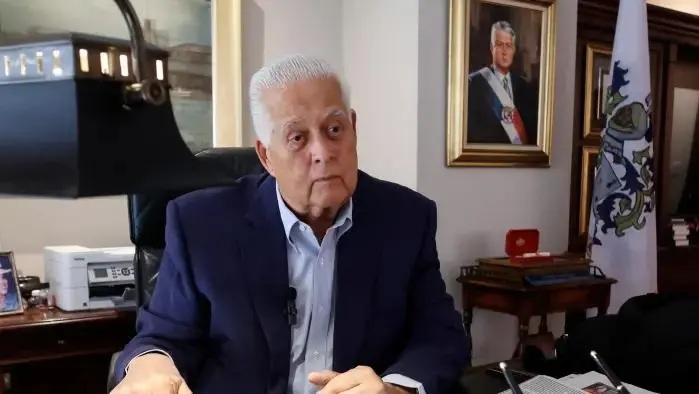An unpredictable finger on the button

By Jonathan Power
Everything gets said, nothing gets done. When President Donald Trump met President Vladimir Putin in Helsinki last month we were promised all sorts of goodies- progress in reconciliation in Ukraine and Syria, and not least nuclear disarmament. If there is progress behind the scenes it’s not noticeable to the naked eye.
 People talk about Trump being in Putin’s pocket yet when, soon after Trump became president, Putin suggested major cuts in nuclear weapons Trump turned him down. This would have been a fantastic way to start his presidency. He could have upped Barack Obama’s achievement of getting the arsenal down to 1550 warheads each. In nearly everything else he wants to destroy Obama’s legacy or minimize it. This would have been a way to do it.
People talk about Trump being in Putin’s pocket yet when, soon after Trump became president, Putin suggested major cuts in nuclear weapons Trump turned him down. This would have been a fantastic way to start his presidency. He could have upped Barack Obama’s achievement of getting the arsenal down to 1550 warheads each. In nearly everything else he wants to destroy Obama’s legacy or minimize it. This would have been a way to do it.
This doesn’t sound to me like Putin, the supposed puppet master, was pulling the strings on his marionette, Trump.
Let that be, maybe we’ll find out the truth soon enough. Meanwhile, the massive stockpile remains, despite enormous cuts (80%) since Cold War days. The US is committed to a 1.7 trillion dollars’ improvement over 30 years in its nuclear arsenal, the price Obama had to pay to get the new treaty with Russia approved in the Senate. (It’s called START.)
In Helsinki, Putin suggested that they extend the life of START, due to expire in 2012 since it only requires both presidents to agree. Parliamentary approval is not necessary. But again Trump seems to be procrastinating.
Meanwhile, many rockets still remain on hair-trigger alert. Many military men worry that under pressure Trump might authorize their use and that a military used to obey orders would initiate a launch. “A demented commander-in-chief could start a conflagration that no one could forestall, veto or stop”, says the Arms Control Association. Added to that are false warnings caused by birds, computer malfunctions etc. There’s also the danger of rogue submarine commanders who can fire their nuclear missiles without a confirming radio signal since they have to surface to receive one. In wartime, they might not be able to safely surface.
Once a Russian attack is launched (or a US one on Russia), the presidents have only six minutes to make a decision if retaliation is to be implemented. Zibigniew Brzezinski, the former National Security Advisor, has talked about how he was awakened in the night and informed by the military that an attack might be on its way. He waited three minutes before he had to phone President Jimmy Carter who was also asleep. Fortunately, at that moment a second call came in, saying it had been a false alarm.
Last week in an amazing statement a group of former intelligence chiefs more or less said, according to an op-ed article in the New York Times, that the military should think twice before following Trump’s orders in a crisis.
The arms race continues. Both sides are developing hypersonic missiles, new missile defense capabilities, offensive cyber weapons and anti-satellite and counter-space weapons. Any of these could disturb the rough equilibrium of the Cold War days when it was clearly obvious that one side couldn’t have an advantage over the other. Putin is still swallowing the bitter pill of President George W Bush’s decision to pull out of the 1972 Anti-Ballistic Missile Treaty, allowing it to press ahead with a land-based missile system that Russia views as a direct, deliberate threat.
Shuffled into a back corner is the joint statement of presidents Ronald Reagan and Mikhail Gorbachev that “a nuclear war cannot be won and must never be fought.”
Judge a person by what he does, not by what he says. The Trump Administration in its new nuclear review suggests the deployment of smaller nuclear bombs that will make them more usable, for example by blocking an advance of troops. It is also leaning towards widening the conditions under which nuclear weapons may be used first in response to a non-nuclear act of aggression. This will revoke Obama-era assurances given to non-nuclear countries that the US would never attack them with nuclear weapons. This would sabotage the Nuclear Nonproliferation Treaty that has done much to keep limited the number of countries that want to develop nuclear weapons.
For the last seven decades, since the end of World War 2, the world is probably living in its most benign years of peace. Yes, there are a number of civil wars but interstate wars have fallen precipitously. As a result territorial conquest has nearly disappeared. Before 1928 the average state could expect to be conquered about once every lifetime. Now the average country will be subject to conquest roughly once or twice in a millennium. So write Oona Hathaway and Scott Shapiro in their book, “The Internationalists”.
Strategists say nuclear weapons help keep this peace. Maybe they do- until something goes wrong. We can’t afford to live with a gamble like that, especially so when Trump has his finger on the button.
Jonathan Power was a member of the International Commission on Common Security, chaired by Prime Minister Olaf Palme of Sweden. The subject was nuclear weapons.





